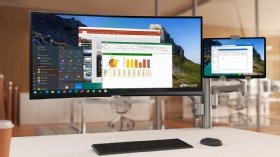
Getty Images/iStockphoto
Samsung extends VMware Horizon to second screen
People running VMware’s virtual desktop on Samsung’s smartphones and tablets can access Windows on both the device and an attached monitor to increase productivity.
Samsung has made it possible to run the VMware Horizon virtual desktop across both an external monitor and an attached Galaxy smartphone or tablet. The capability provides hybrid workers without a PC the option of using Windows across two displays.
Samsung's Desktop Experience (DeX) lets people connect their Galaxy mobile devices to a monitor, keyboard and mouse to run Android and Windows applications on a bigger screen. People can join the devices with Bluetooth or a USB-C cable.
The latest announcement extends the display capability to VMware's virtual desktop running on a Galaxy device, Samsung said last week. Companies running VMware's virtual desktop infrastructure in the data center have requested the feature to make remote work more accessible.
"It's almost perfect timing for it," as corporate employees bounce between remote and in-office work as the COVID-19 pandemic wanes, said IDC analyst Phil Hochmuth. Also, using an external monitor makes employees more productive, he added.
Some employees might get by using a Galaxy device and monitor instead of a PC, said Andrew Hewitt, an analyst at Forrester Research. "It should make it easier for IT admins to manage remote hardware because they won't have to send full PCs to people's homes -- perhaps just a few peripherals."

Samsung devices supporting the latest capability include the Tab S series, starting with S4, and the Tab Active series tablets, starting with Active 3. Other hardware consists of the Galaxy S smartphones series, beginning with the S8 and all Z Fold series smartphones.
Samsung's latest mobile devices, the Galaxy Tab 8 series tablets and the Galaxy S22 series smartphones, will support screen sharing while running the Horizon virtual desktop. Samsung unveiled the new hardware at its Unpacked event last week.
Samsung designed DeX in a way that turns its flagship devices into thin clients. In addition to VMware, Samsung has worked with Microsoft to run a Windows Virtual Desktop on their devices.
Running a virtual desktop on a mobile device has become more feasible in recent years due to the rise of more powerful smartphones and tablets. Finance and healthcare are among the vertical industries most likely to use mobile devices in place of a PC.
Proponents argue that mobile desktop virtualization offers flexibility to workers on the go and addresses security concerns when a device is lost or stolen. But until Samsung's DeX, a mouse input wasn't possible on certain legacy apps, including virtual desktops.
Maxim Tamarov is a news writer covering mobile and end-user computing. He previously wrote for The Daily News in Jacksonville, N.C., and the Sun Transcript in Winthrop, Mass. He can be found on Twitter at @MaximTamarov.








